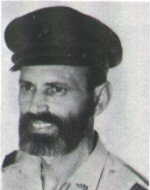Berkovits, Gershon-Shmuel
Son of Menachem and Rivka. He was born on September 10, 1923, in Klausburg (Cluj), Romania. He studied at the elementary school in the city of Kielce, and later studied in the “cheder” and “yeshivas.” In Cluj he studied at the Chatam Sofer Yeshiva and became a rabbi and teacher, and during the holidays he could not see children wandering around. He devoted himself exclusively to Torah literature, and was able to sit and study continuously for hours on end without interruption, and during his free time he was impressed with Torah novellae and rhymes in a wonderful artistic manner, in the style of the Talmud, Yiddish and Hebrew. Including Torah scholars, were lost to him during the Second World War. His name preceded him, but he did not manage to rise to prominence in one of the congregations. He was sent to a labor camp and despite the terrible torments he experienced, he managed to preserve his Jewishness. Gershon-Shmuel was drafted into the IDF in June 1948 and in 1950 joined the regular army. In 1968 he wanted to receive an academic supplement thanks to Torah education. Then he went to see Rabbi Abuchatzeira and the rabbi of Acre and re-accepted rabbinical ordination. Many letters and documents have accumulated and praise him, including a letter from one of the rabbis indicating that the Chief Rabbi of Tel Aviv testified to him that in the year 5708 he did not find an obstacle under his hand and many letters attesting that he is familiar with the laws of Israel and that one can rely on a man like him He knew that he was humble and low in the knee, and although he had spent seven generations of hell in the Holocaust, he had restored his home in the Holy Land, he was Simcha and Simcha in his part “The IDF did not want to serve as a military rabbi, because he did not want to do the Torah as a hurdle to dig and” loved the angel And hate authority, “he began his service as a soldier just before reaching for his years of service to the rank of Major, has considerable powers. His qualities and talents made him name and he was fond of his subordinates and commanders. He was a peace seeker and wanted to make peace between rivals. Gershon-Shmuel was privileged to establish a blessed generation of righteous men, a son and two daughters who followed in the footsteps of their forefathers. All his life he was concerned about the education of his children in ultra-Orthodox schools. He would study with his son on Saturdays and would add to him weekly innovations of the Rishonim, such as the Rishonim and even his own. Many people who knew his greatness and invited him to preach Halachic and aggadic sermons in synagogues in the vicinity of his residence, and on such occasions he used to take his son with him to add knowledge and wisdom. He died of an illness during his service, leaving a wife, a son and two daughters, brought to rest in the cemetery in Zichron Meir.
